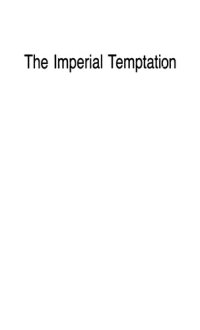
Ebook: The Imperial Temptation: The New World Order and America's Purpose
Author: Robert W. Tucker, David C. Hendrickson
- Year: 1992
- Publisher: New York University Press
- Language: English
- pdf
"The peril is not preeminently to the nation's purse; it is to its soul. The danger is not so much that we will fail to protect our interests, it is that we will betray our historic ideals . . . . . There is no assumption made here that the nation has always lived up to its deals; it did, however, always look up to them. We believe that it needs to do so again."
--from the Introduction
In The Imperial Temptation, two eminent foreign policy experts warn that America has made a Faustian bargain in its quest for the leadership of a new world order. In its attempts to address the challenges posed by new global realities, the Bush administration, so argues The Imperial Temptation, has betrayed the fundamental ideals on which this country was founded.
Criticizing the all-out military assault on Iraq as a disproportionate and inhumane response to the crisis, Tucker and Hendrickson argue that President Bush seized on the Iraqi invasion of Kuwait to crystallize its vision of a new world order that would reclaim America's position of world leadership. But, in choosing to wage war against Iraq when another alternative was available, the authors write, Bush made the use of force the centerpiece of his vision of world order. As a result, America has fastened on a formula that allows us to go to war with far greater precipitancy that we otherwise might while simultaneously allowing us to walk away from the ruin we create without feeling a commensurate sense of responsibility. By leaving Iraq in chaos, America has succumbed to an imperial temptation without discharging the classic duties of imperial rule.
The Imperial Temptation makes an important--and what is sure to be viewed as controversial--contribution to the national debate over the future of U.S. foreign policy and offers a revealing examination of the classic ideas underlying American diplomacy and their relation to the nation's historic purpose.
--from the Introduction
In The Imperial Temptation, two eminent foreign policy experts warn that America has made a Faustian bargain in its quest for the leadership of a new world order. In its attempts to address the challenges posed by new global realities, the Bush administration, so argues The Imperial Temptation, has betrayed the fundamental ideals on which this country was founded.
Criticizing the all-out military assault on Iraq as a disproportionate and inhumane response to the crisis, Tucker and Hendrickson argue that President Bush seized on the Iraqi invasion of Kuwait to crystallize its vision of a new world order that would reclaim America's position of world leadership. But, in choosing to wage war against Iraq when another alternative was available, the authors write, Bush made the use of force the centerpiece of his vision of world order. As a result, America has fastened on a formula that allows us to go to war with far greater precipitancy that we otherwise might while simultaneously allowing us to walk away from the ruin we create without feeling a commensurate sense of responsibility. By leaving Iraq in chaos, America has succumbed to an imperial temptation without discharging the classic duties of imperial rule.
The Imperial Temptation makes an important--and what is sure to be viewed as controversial--contribution to the national debate over the future of U.S. foreign policy and offers a revealing examination of the classic ideas underlying American diplomacy and their relation to the nation's historic purpose.
Download the book The Imperial Temptation: The New World Order and America's Purpose for free or read online
Continue reading on any device:

Last viewed books
Related books
{related-news}
Comments (0)